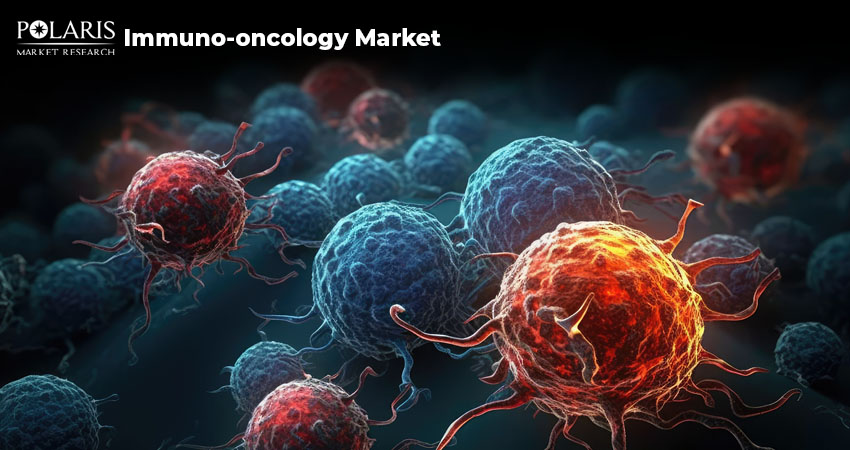Listing Major Contributors to Immuno-oncology Market Growth and Innovation in 2025

Immuno-oncology (IO) is a novel approach that uses the body's immune system to detect, attack, and destroy cancer cells, providing hope to patients with previously incurable diseases. Unlike traditional therapies such as chemotherapy and radiation, Immuno-oncology uses the inherent ability of immune cells to fight tumors, providing more targeted and long-lasting solutions.
This field has transformed the cancer treatment landscape globally, spurring significant research and investment. In this blog, we explore the scope of immuno-oncology, its groundbreaking therapies, global market trends, and major companies driving this medical revolution. Continue reading!
The Science Behind Immuno-Oncology
Cancer cells frequently dodge the immune system by using mechanisms like immune checkpoint pathways or changing their surface proteins. Immuno-oncology therapies counter these strategies by:
- Activating T-Cells
Activating T-cell therapies increases the activity of T-cells in the immune system in the human body, allowing them to recognize and kill cancer cells.
- Blocking immune Checkpoints
Drugs such as checkpoint inhibitors prevent cancer cells from "turning off" immune responses.
- Engineered Immune Cells
CAR-T cell therapy is a technology that uses patient-derived immune cells to attack cancer.
Major Therapies in Immuno-oncology
- Checkpoint Inhibitors
Checkpoint inhibitors inhibit proteins such as PD-1, PD-L1, and CTLA-4, which tumors use to evade immune detection. These therapies have proven to be extremely effective in the treatment of melanoma, lung cancer, and other diseases.
Chimeric antigen receptor T-cell (CAR-T) therapy reprograms a patient's T-cells to target specific antigens on tumor cells. These have shown efficacy in treating blood cancers such as lymphoma and leukemia.
- Cancer Vaccines
Vaccines against cancer encourage the immune system to identify and combat cancer. For example, Dendreon's Sipuleucel-T (Provenge) is used to treat prostate cancer. Personalized neoantigen-based vaccines are still being researched.
- Oncolytic Viruses
Oncolytic viruses trigger an immune response while specifically infecting and killing cancer cells. The FDA has approved Amgen's talimogene laherparepvec (T-VEC), an oncolytic virus treatment for melanoma.
- Bispecific Antibodies
Direct tumor attack is made possible by these engineered antibodies' simultaneous binding to immune and cancer cells. One prominent example is Amgen's Blincyto (Blinatumomab).
Market Influencing Trends Worldwide
The market for immuno-oncology has expanded rapidly due to rising cancer rates and advances in technology. Following are some of the key drivers of the immuno-oncology market:
- Increasing Cancer Prevalence
The rising prevalence of different types of cancers, such as lung, breast, and colorectal cancer, is driving demand for effective treatments.
- Innovations in Various Technologies
Different kinds of advances in various technologies, like bioinformatics and genomics, are driving personalized immuno-oncology treatments.
- Regulatory Support
Many governments are accelerating regulatory approval pathways for breakthrough therapies to promote market entry.
- Growing Applications of Different Immuno-oncology Therapies
Immuno-oncology therapies are being investigated for solid tumors, pediatric cancers, and combination regimens.
Leading Players in Market
- Merck & Co.
The headquarters of the multinational American pharmaceutical corporation Merck & Co., Inc. are located in Rahway, New Jersey, USA. It was established in 1891 with the goal of distributing high-quality chemicals across New York City and the surrounding regions. Merck's blockbuster drug Keytruda has transformed immunotherapy, with approvals for more than 30 cancer types worldwide. The company continues to invest in Immuno-oncology pipelines, looking into combination therapies and expanding indications.
The American biopharmaceutical company Bristol-Myers Squibb Company was formed in 1989. It manufactures vitamins, medications, medical equipment, cosmetics, and personal hygiene items. BMS is a pioneer in checkpoint inhibitors, developing Opdivo and Yervoy, which are still the leading Immuo-oncology treatments today. BMS also makes significant investments in CAR-T therapies and bispecific antibodies.
- Pfizer
Established in 1849, Pfizer is a multinational pharmaceutical and biotechnology company based in Manhattan, New York City, with its headquarters located at The Spiral. With an emphasis on checkpoint inhibitors like Bavencio (avelumab), which was created in collaboration with Merck KGaA, and new oncolytic viruses, Pfizer works closely on IO.
- AMGen
Applied Molecular Genetics Inc. (AMGen) was founded in Thousand Oaks, California, USA in 1980. AMGen is a significant Immuno-oncology innovator due to its proficiency in oncolytic virus treatments and bispecific antibodies. Two essential products in its portfolio are T-VEC and blincyto.
Established in 1996, Novartis AG is a multinational pharmaceutical company with its headquarters located in Basel, Switzerland. Novartis is one of the biggest pharmaceutical companies in the world and is regularly ranked in the top five worldwide. With Kymriah, the first FDA-approved CAR-T treatment, Novartis has made great progress. The companies also focuses on adding a combination of immuno-oncology regimens and solid tumors to its pipeline.
Future of Immuno-Oncology
Combination therapies and personalization are key to immuno-oncology's future. Important areas of attention consist of the following.
- Neoantigen-Based Vaccines
Neoantigen-based vaccines are being developed with the help of tumor-specific mutations to design personalized vaccines.
- Combination Therapies
Combination therapies enhance the efficacy of therapies by combining immuno-oncology with radiation, chemotherapy, or targeted therapies.
- Advanced Delivery Systems
The use of gene editing techniques like CRISPR and nanotechnology could improve the accuracy of treatments in immuno-oncology therapies.
- Integration of Artificial Intelligence (AI)
AI-driven insights are accelerating drug discovery and patient selection for trials for Immuno-oncology treatments.
Conclusion
Immuno-oncology is changing the way we treat cancer, providing hope to millions of patients around the world. With rapid advancements, global collaborations, and a focus on innovation, immuno-oncology is poised to make even greater breakthroughs in the coming decades. As companies continue to push the envelope, the ultimate goal of curing cancer may no longer be a distant dream.

